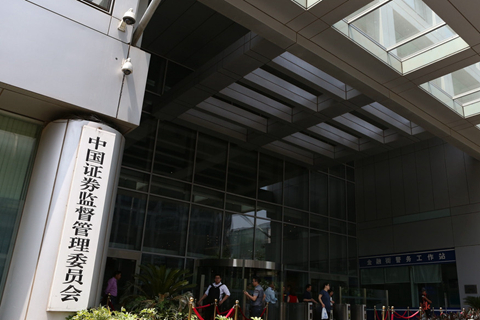Regulator Warns Companies Against Intentional IPO Delays

China’s securities regulator is zeroing in on companies suspected of deliberately slowing down their applications to go public to avoid stricter oversight, in the latest push to speed up the approval process for initial public offerings (IPOs).
The China Securities Regulatory Commission summoned executives of 15 brokerages to further clarify circumstances in which it would suspend IPO reviews and set deadlines for applicants to respond to regulators’ queries, Caixin learned from sources close to the matter.
The meeting came on the heels of the CSRC issuing guidelines last week on what circumstances would trigger a suspension of an IPO review.
The two moves reflect the regulator’s concern that some companies are intentionally delaying the process to avoid what has become tougher CSRC scrutiny of IPO applications.
This year, China stepped up efforts to accelerate its IPO approval process. That followed a pledge by CSRC Chairman Liu Shiyu—who took the helm in March 2016 — to allow more companies to go public to expand their funding sources.
During the first 10 months of this year, China approved 359 out of 503 IPO applications, a record high that surpassed the previous yearly record of 347 successful IPOs in 2010.
But the pace of approval has been uneven and slowed in recent months, following investigations of several CSRC officials who allegedly granted favors to now financially crippled Leshi Internet Information & Technology Corp. in its 730-million-yuan ($110.4 million) public listing in 2010.
In October, the CSRC reshuffled its panel that reviews IPO applications, resulting in a stricter approach to reviews. In November, the new panel has approved just 57% of applicants, down from an average of 81% during the previous committee’s tenure, which lasted the first nine months of the year.
As the regulator tightened its grip, some companies that had filed IPO applications tried to postpone their review schedule by revising some information or delaying their response to regulators’ queries, people with knowledge of the matter said.
At the latest meeting with the 15 brokerages, CSRC officials said relatively minor revisions — such as changes in an applicants’ law firm, auditors and other intermediary agencies — will not delay the review process. Meanwhile, the regulator will launch spot checks of companies suspected of intentionally delaying the process, according to an investment bank source.
According to last week’s guidelines, the CSRC review panel would consider suspending an application if the company, or its major shareholder, sponsor or underwriting lawyers are subject to investigations for misconduct. An applicant replacing its IPO sponsor could also trigger a suspension.
The CSRC further clarified at the meeting with the 15 brokerages that the new sponsors will face higher due diligence requirements and the suspension period won’t exceed three months.
The commission also required IPO applicants and their sponsors to respond to regulators’ inquires or requests for additional materials within two months. Those who fail to respond on time will face inspection or have their applications dropped.
According to a CSRC official, about 200 companies’ IPO applications are currently suspended for various reasons. That has hindered the overall IPO review pace.
In the past, the IPO process — from application to approval to trading — usually took up to three years. This year, that speeded up to an average wait of 15 months, according to Xuan Changneng, assistant chairman of the CSRC. But by eliminating unnecessary suspensions, the overall review period will be cut in half — to six to seven months — the CSRC official said.
About 500 IPO applications are awaiting regulatory review, down sharply from 895 as of the end of June, Xuan told a forum in Beijing last week.
The CSRC is still reviewing applications submitted last year or earlier, Xuan said at the forum.
“Toward the end of this year, the panel will likely get to review IPO applications filed this year,” he said.
Contact reporter Han Wei (weihan@caixin.com)

- 1Cover Story: China Carves Out a Narrow Path for Offshore Asset Tokenization
- 2Drownings Shake Chinese Enthusiasm for Travel to Russia
- 3China Business Uncovered Podcast: A $15 Billion Bitcoin Seizure and the Fall of a Cybercrime Kingpin
- 4Over Half of China’s Provinces Cut Revenue Targets
- 5In Depth: Inside the U.K.’s China-Linked Shell Company Factory
- 1Power To The People: Pintec Serves A Booming Consumer Class
- 2Largest hotel group in Europe accepts UnionPay
- 3UnionPay mobile QuickPass debuts in Hong Kong
- 4UnionPay International launches premium catering privilege U Dining Collection
- 5UnionPay International’s U Plan has covered over 1600 stores overseas






